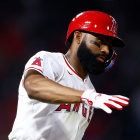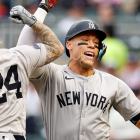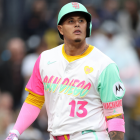Four years ago, Kris Bryant made history.
Baseball's No. 1 prospect entering the 2015 season according to Baseball America, Bryant was coming off a season in which he blasted 43 home runs across the Double-A and Triple-A levels, batting .325/.438/.661. He was not only the best hitting prospect in the game then, but one of the best and most advanced hitters minor-league baseball had ever seen. He then smoked higher-level pitching in spring training, setting the stage for a promotion that would add yet another young star to the Cubs' growing stable.
Cubs management appreciated all those flashy numbers. But, the club insisted, Bryant still had work to do.
"As I told Kris last September and again at the start of spring training, we view him as nearly big league ready," Cubs president of baseball operations Theo Epstein said in March of that year. "The remaining area for improvement is his defense -- something Kris agrees with."
Spring training would serve as a test to if Bryant had improved his defense to the level that would allow him to be big-league-ready.
"If enough time remains to get Kris into a good rhythm defensively at, we may consider putting him on the club," Epstein said at the time. "If not, we see nothing wrong with using the early part of the season at Iowa to get him in that rhythm. We believe he's going to be an outstanding defender in time; we want him comfortable when he makes the leap to the highest level."
Bryant continued to rake in spring training, putting on one of the most impressive displays in Cactus League history, with nine home runs and a batting line of .425/.477/1.175. Unfortunately, the Cubs didn't think enough of his defense to hand him a major-league gig. So back he (and Javier Baez and Addison Russell) went to the minors, at the end of spring training. With months of intensive instruction, maybe Bryant the butcher could develop into a semi-competent fielder, one whose defense would be good enough to justify barely squeezing his MVP-caliber bat into the lineup. In the meantime, the Cubs would go with budding superstar Mike Olt as its Opening Day third baseman instead.

That's when the miracle happened. Bryant started the season at Triple-A Iowa, just as Epstein suggested. In his first seven games there, Bryant launched three more home runs, batting .321 and slugging .679. But more than just continue the status quo as a beastly hitter with no glove, Bryant suddenly transformed. Possessing the defensive talent of a blind, one-legged raccoon just two weeks earlier, the Iowa air had turned him into the second coming of Brooks Robinson.
Who can forget the mania that ensued. Teams of scientists descended on Des Moines to try and figure out how this had happened. Twenty-nine other teams began courting the Cubs' Triple-A coaches and roving instructors, offering multi-million-dollar contracts if they'd agree to bring their magical instructional techniques to another franchise. When "The X-Files" rebooted the following year, few knew the real truth behind the show's comeback: They were betting it all on a 10-part episode that would attempt to solve the mystery of how Kris Bryant could go from not being good enough to play in the major leagues to major league-ready in a span of seven minor-league games. (Sadly, that 10-part series never aired. The only known copy of it is buried under David Duchovny's garage.)
Oh sure, cynics argued that the Cubs held Bryant back just long enough to gain an additional year of club control. But true believers know that Bryant making his major-league debut on the exact day after he'd lost under MLB service time to keep him with the team for another year was just a wild, cosmic coincidence. Seven minor-league games was exactly how much time he needed to go from being the worst defensive player in the history of the sport to a player who became a plus defender by advanced metrics.
No more than seven, no fewer than seven.
Baseball America, Baseball Prospectus, MLB.com, and ESPN have all released their top 100 (or 101) top prospects list over the past few days. It's an exciting time for seamheads, who get to dream on the stars of tomorrow. Before Mike Trout, Bryce Harper, and Bryant himself became elite major-league talents, they were kids lighting up minor-league pitching, impressing scouts and pumping up their rankings.
Unfortunately, we live in an era in which baseball teams' general managers are more calculating and less sentimental than they've ever been. There's nothing prohibiting teams from slashing payroll and not trying to win for several years, so they dress that up as smart management, line the owners' pocketbooks, and sell it to fans. There's nothing stopping even ultra-rich teams from claiming the luxury tax and other specious factors as reasons to avoid bidding for generational (and generationally young) free agents like Harper and Manny Machado, so they use their billions in television money and other revenue streams to sign lower-tier players instead -- then blaming reporters for making up fake fan grievances.
So if an all-world player like Bryant is going to be held back by a mega-revenue organization that ended up charging to the playoffs that same year, what incentive to teams in less optimal situations have to do anything but stall their best prospects' service time?
Sure, the Blue Jays could use a boost in fan interest after leading the league in attendance for two straight years, then watching it fall during a disappointing 2018 campaign. But the people who run Toronto's front office have to weigh that set of circumstances against the enormous potential of Vladimir Guerrero Jr. If the Jays really have a once-in-a-lifetime talent on their hands in Vlad Jr., and they can keep him an extra year if they're willing to send him to the minors for a couple weeks, why wouldn't they do that -- especially in a season in which they're probably not going to win anything even if Guerrero wins the Triple Crown? Hell, once you're holding him back for a couple weeks, just add a couple months and you can suppress his salary too, knocking him out of the Super Two class of players who become eligible for salary arbitration a year early, thus costing their teams millions of additional dollars. It's worth noting that many thought Guerrero was ready last year and wasn't called up, so you could argue that he has already been a victim of service-time manipulation.

You can run this exercise for gobs of other hot-shot prospects too. After years of outrageously cheap ownership tactics, the Padres have finally shown at least snippets of interest in spending money, including throwing an eight-year, $144 million contract at Eric Hosmer (a move that looked terrible at the time and looks worse after a miserable 2018 season for Hosmer, but anyway). But after a sub-.500 season and an offseason that's been rife with rumors but short on actual impact moves, would the Padres really push future star Fernando Tatis Jr. into the Opening Day lineup? Or would they be more likely to hold him back until mid-April ... or mid-June ... or later?
As distasteful as it is to watch teams manipulate players' service time, Epstein and others like him have simply been doing what they're paid to do: win baseball games, and help their bosses make as much money as possible at the same time.
The blame here falls on the MLB Players Association. Bryant filed a grievance against the Cubs after that 2015 season. Yet when the union negotiated a new collective bargaining agreement with the owners a year later, service-time manipulation never made it in.
Instead, the union got concessions that included ... who the hell knows, given that owners' share of the overall revenue pie continues to grow, while dozens of free agents are left scrambling for bottom-of-the-barrel contracts well into January, February, and even March.
With labor relations now worsening by the day, it's possible that the owners and players will be doing their damndest to avoid a work stoppage when the current CBA expires in three years. Simply put, there will likely be far bigger fish to fry than preventing the next Kris Bryant from getting screwed because of arcane and unjustifiable service-time rules.
So enjoy the buzz swirling around Vlad Jr., Tatis, Eloy Jimenez, and all the other luminaries poised to take the baseball world by storm. Just be prepared to wait longer than you should. Because when it comes to how it handles the issue of player service time, Major League Baseball is broken.






















